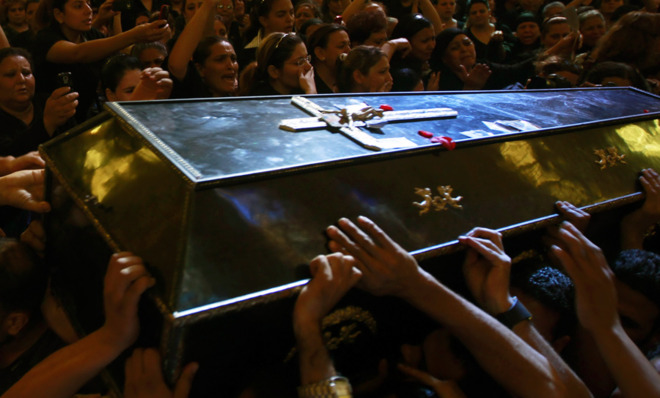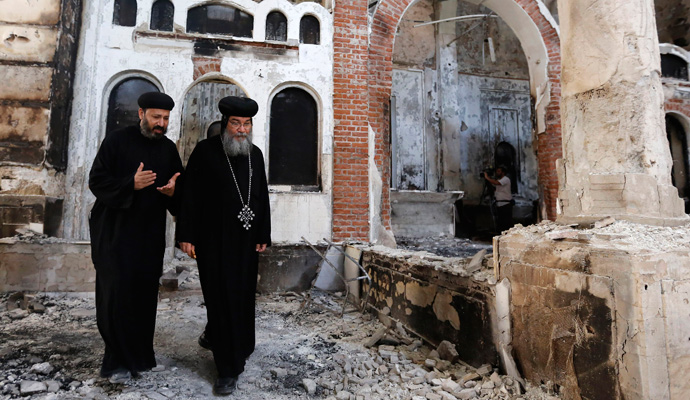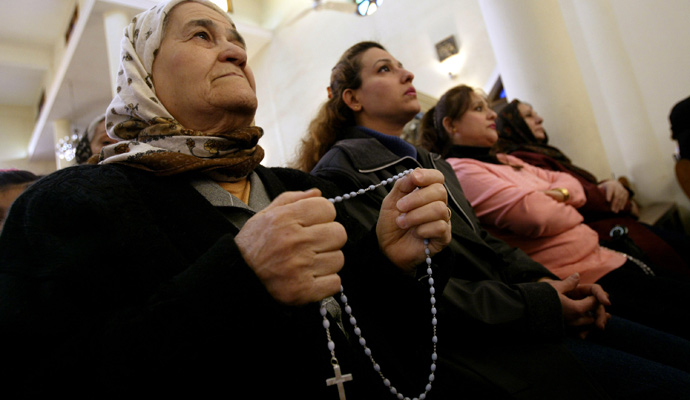The world's most ancient Christian communities are being destroyed — and no one cares
Christians in the Middle East have been the victims of pogroms and persecution. Where's the outrage in the West?


A free daily email with the biggest news stories of the day – and the best features from TheWeek.com
You are now subscribed
Your newsletter sign-up was successful
Like many Coptic Christians in Egypt, Ayman Nabil Labib had a tattoo of the cross on his wrist. And like 17-year-old men everywhere, he could be assertive about his identity. But in 2011, after Egypt's revolution, that kind of assertiveness could mean trouble.
Ayman's Arabic-language teacher told him to cover his tattoo in class. Instead of complying, the young man defiantly pulled out the cross that hung around his neck, making it visible. His teacher flew into a rage and began choking him, goading the young man's Muslim classmates by saying, "What are you going to do with him?"
Ayman's classmates then beat him to death. False statements were given to police, and two boys were taken into custody only after Ayman's terror-stricken family spoke out.
The Week
Escape your echo chamber. Get the facts behind the news, plus analysis from multiple perspectives.

Sign up for The Week's Free Newsletters
From our morning news briefing to a weekly Good News Newsletter, get the best of The Week delivered directly to your inbox.
From our morning news briefing to a weekly Good News Newsletter, get the best of The Week delivered directly to your inbox.
Ayman's suffering is not an isolated case in Egypt or the region.
The Arab Spring, and to a lesser extent the overthrow of Saddam Hussein, were touted as the catalysts for a major historic shift in the region. From Egypt to Syria to Iraq, the Middle East's dictatorships would be succeeded by liberal, democratic regimes. Years later, however, there is very little liberality or democracy to show. Indeed, what these upheavals have bequeathed to history is a baleful, and barely noticed legacy: The near-annihilation of the world's most ancient communities of Christians.
The persecution of Christians throughout the Middle East, as well as the silence with which it has been met in the West, are the subject of journalist Ed West's Kindle Single "The Silence of Our Friends." The booklet is a brisk and chilling litany of horrors: Discriminatory laws, mass graves, unofficial pogroms, and exile. The persecuted are not just Coptic and Nestorian Christians who have relatively few co-communicants in the West, but Catholics, Orthodox, and Protestants as well.
Throughout the Middle East the pattern is the same. Christians are murdered in mob violence or by militant groups. Their churches are bombed, their shops destroyed, and their homes looted. Laws are passed making them second-class citizens, and the majority of them eventually leave.
A free daily email with the biggest news stories of the day – and the best features from TheWeek.com

August 26, 2013: Bishop-General Macarius (right), a Coptic Orthodox leader, walks around the damaged Evangelical Church in Minya, south of Cairo. | (REUTERS/Louafi Larbi)
In Egypt, a rumor that a Muslim girl was dating a Christian boy led to the burning of multiple churches, and the imposition of a curfew on a local Christian population. Illiterate children were held in police custody for urinating in a trash heap, because an imam claimed that pages quoting the Koran were in the pile and had been desecrated. Again, the persecution resulted in Christian families leaving their homes behind.
In Syria, the situation is even worse. In June 2013, a cluster of Christian villages was totally destroyed. Friar Pierbattista Pizzaballa reported that "of the 4,000 inhabitants of the village of Ghassanieh... no more than 10 people remain."
Two Syrian bishops have been kidnapped by rebel groups. Militants expelled 90 percent of the Christians in the city of Homs. Patriarch Gregorios III of Antioch says that out of a population of 1.75 million, 450,000 Syrian Christians have simply fled their homes in fear.
In Iraq, the story is the same but more dramatic. According to West, between 2004 and 2011 the population of Chaldo-Assyrian Christians fell from over a million to as few as 150,000. In 2006, Isoh Majeed, who advocated the creation of a safe haven for Christians around Nineveh, was murdered in his home. The number of churches in Iraq has declined to just 57, from 300 before the invasion. The decline of Iraq's Christian population since the first Gulf War is roughly 90 percent, with most of the drop occurring since the 2003 invasion.
The U.S. and the U.K. bear some responsibility in this catastrophe, since they oversaw the creation of Iraq's postwar government and did little to protect minority faiths.
West's book touches on the clueless and callous behavior of Western governments in these episodes. U.S. reconstruction aid to Iraq is distributed according to Iraqi laws that discriminate against Christian Iraqis. The U.S. pours billions of foreign aid into Egypt, and yet the Christians in that country are not allowed to build churches (or even so much as repair toilets in them) without explicit permission from the head of state, almost never granted. Last September, the U.S and Britain attempted to make their support of Syrian rebel groups explicit and overt, but at the same time some of these militias were executing a pogrom against Christians.
A Christian shopkeeper in Ma'loula summed it up in a quote to the BBC: "Tell the EU and the Americans that we sent you Saint Paul 2,000 years ago to take you from the darkness, and you sent us terrorists to kill us."
In an email to The Week, Ed West says there are things America and its allies can and should do to aid persecuted Christians:
Western countries should make clear that our friendship, cooperation, aid, and help depends on: 1) Religious freedom, which includes the right to change or leave religions; 2) A secular law that treats all people the same. That was not the case in Mubarak's Egypt, which the U.S. helped to prop up with $500 million a year. That is not the case in Iraq, which under U.S. control instigated sharia into its constitution. That shouldn't be acceptable. In 2022, Qatar will host the World Cup, a country where death for apostasy is still on the statute books. Why aren't we all boycotting it?
The last request does put the plight of Middle Eastern Christians in global context. Western activists and media have focused considerable outrage at Russia's laws against "homosexual propaganda" in the lead-up to the 2014 Sochi Winter Olympics. It would only seem fitting that Westerners would also protest (or at the very least notice) laws that punish people with death for converting to Christianity.

December 25, 2008: Iraqi Christians attend Christmas mass at the Virgin Mary church in Baghdad. | (Wathiq Khuzaie/Getty Images)
And yet the Western world is largely ignorant of or untroubled by programmatic violence against Christians. Ed West, citing the French philosopher Regis Debray, distils the problem thusly: "The victims are 'too Christian' to excite the Left, and 'too foreign' to excite the Right."
Church leaders outside the Middle East are afraid to speak out, partly because they fear precipitating more violence. (Seven churches were fire-bombed in Iraq after Pope Benedict XVI quoted an ancient criticism of Islam in an academic speech in Germany.) Oddly, unlike Iran, Saudi Arabia, Israel, and Russia, the U.S. and the U.K. are the only powers acting in the Middle East that do not take any special interest in the safety of those with whom they have a historical religious affinity.
These are the lands in which Jesus' apostles and their disciples made some of the first Christian converts. In an interview, West pointed out that these communities "were Christian when our ancestors were worshipping trees and stones." Now they are in danger of imminent extinction.
In 2013, Raphael I Sako, the Chaldean Patriarch of Baghdad, said the following at his installation homily, "Still the shadow of fear, anxiety, and death is hanging over our people." He warned: "If emigration continues, God forbid, there will be no more Christians in the Middle East. It will be no more than a distant memory." West's book is a sobering reminder that Western policy has helped shape this grim fate for Middle Eastern Christians — and Western silence allows it to continue.
Michael Brendan Dougherty is senior correspondent at TheWeek.com. He is the founder and editor of The Slurve, a newsletter about baseball. His work has appeared in The New York Times Magazine, ESPN Magazine, Slate and The American Conservative.
-
 What are the best investments for beginners?
What are the best investments for beginners?The Explainer Stocks and ETFs and bonds, oh my
-
 What to know before filing your own taxes for the first time
What to know before filing your own taxes for the first timethe explainer Tackle this financial milestone with confidence
-
 The biggest box office flops of the 21st century
The biggest box office flops of the 21st centuryin depth Unnecessary remakes and turgid, expensive CGI-fests highlight this list of these most notorious box-office losers
